
The Definitive Guide to Mortuary Storage Solutions
Why Professional Mortuary Storage is Essential for Every Funeral Home
Mortuary-storage systems are specialized refrigeration solutions designed to preserve human remains at temperatures between 2°C and 5°C, ensuring dignity, hygiene, and regulatory compliance for funeral homes, hospitals, and morgues. These systems range from compact 1-body cabinets to large walk-in cold rooms accommodating 100+ bodies.
Quick Reference for Mortuary Storage Solutions:
- Cold Rooms: Walk-in units for high-volume facilities (10-100+ bodies)
- Refrigerated Cabinets: Compact units available in 1-20 body configurations
- Mobile Units: Portable solutions for emergency surge capacity
- Mortuary Racks: Multi-tier storage systems (2-5 tiers) for space efficiency
- Temperature Range: Maintain 2°C to 5°C for optimal preservation
- Key Features: NSF approval, antimicrobial surfaces, backup systems
Recent events like the pandemic and natural disasters have highlighted the critical importance of scalable mortuary storage. As one industry expert noted, "Recent events such as the pandemic, natural disasters, and the opioid epidemic have raised concerns about the treatment of human remains."
Modern facilities must balance respectful care with practical needs - from accommodating cultural viewing periods to managing forensic investigations. Whether you're planning a new facility or upgrading existing equipment, understanding your options helps ensure both regulatory compliance and compassionate service to grieving families.
I'm Mortuary Cooler, a national-level mortuary cooler supplier specializing in American-made refrigeration solutions for funeral homes and medical facilities. With experience in mortuary-storage system design and installation, I've helped countless facilities choose the right cooling solutions for their unique needs and space constraints.
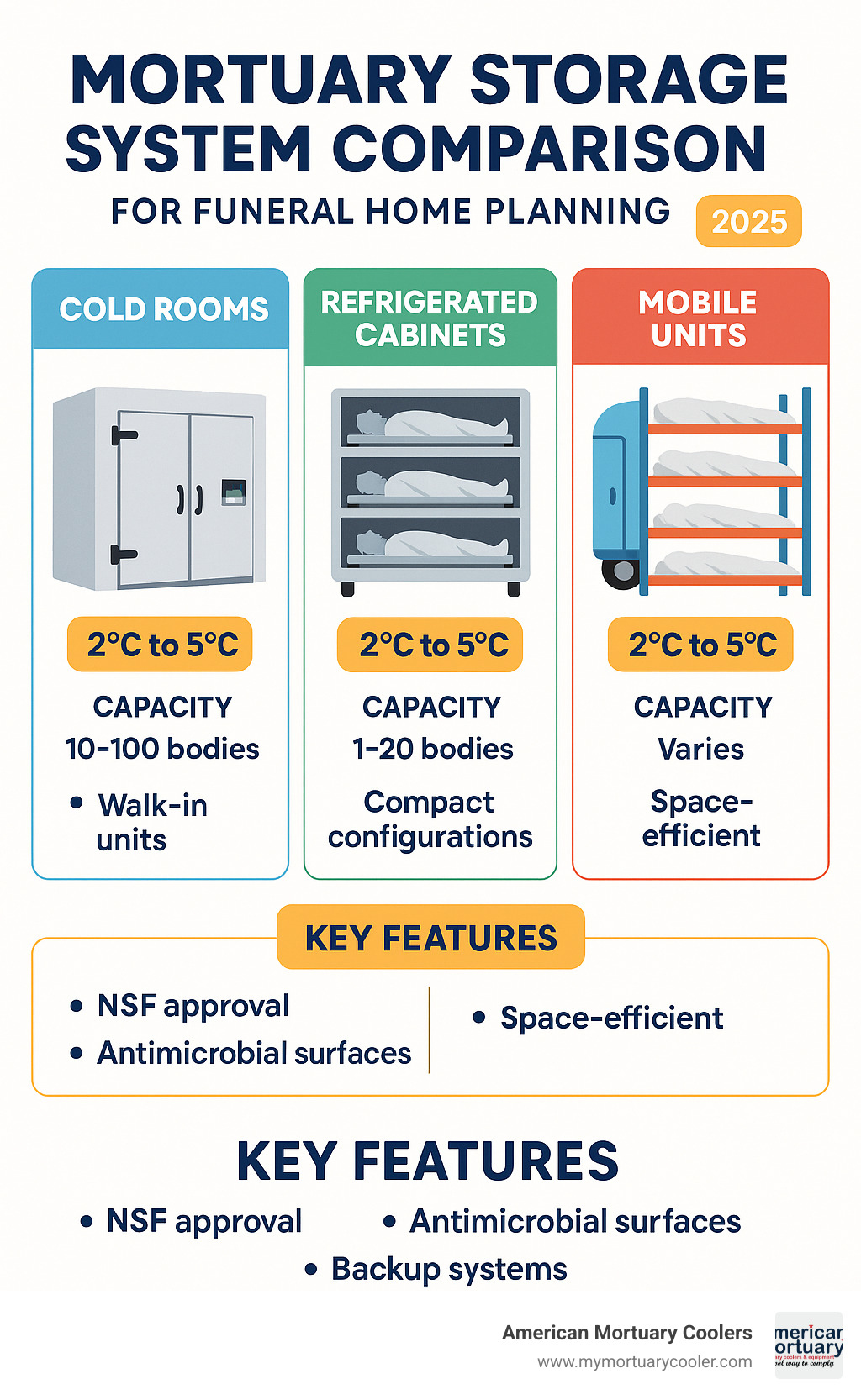
Mortuary-storage terms you need:
Why This Guide Matters
The funeral industry has evolved significantly, with modern facilities needing to meet increasingly complex industry standards while managing surge capacity during emergencies. Grieving families deserve the assurance that their loved ones are being cared for with the utmost respect and professionalism. This guide provides the comprehensive information you need to make informed decisions about mortuary-storage solutions that protect both dignity and public health.
Mortuary-Storage Fundamentals & System Types
When you're choosing the right mortuary-storage system for your facility, understanding your options makes all the difference. Think of it like selecting the right tool for the job - each type serves specific needs and circumstances.
Cool rooms are the workhorses of high-volume facilities. These walk-in refrigerated spaces can handle anywhere from 10 to over 100 bodies, making them perfect for busy hospitals or large funeral homes. They maintain that crucial 2-5°C temperature range and often use direct-contact cooling technology to bring bodies to proper storage temperature quickly.
Refrigerated cabinets offer a more compact approach. These mortuary cabinets come in configurations from single-body units all the way up to 20-body storage systems. The sweet spot seems to be the mid-range options - 2-body units (with 55 models available), 3-body (36 models), and 4-body configurations (27 models) are the most popular choices among funeral directors.
Mobile units have become game-changers, especially after recent events showed us how quickly storage needs can spike. These portable morgue freezers can be deployed rapidly during disasters or pandemic situations. Some facilities keep them on standby, while others rent them as needed.
Racking systems maximize your space efficiency by going vertical. These multi-tier solutions can transform a small footprint into significant storage capacity, which is especially valuable in urban areas where every square foot counts.
More info about storage basics
How Mortuary-Storage Cold Rooms Work
The engineering behind mortuary-storage cold rooms is actually quite neat. These systems use evaporator coils - usually mounted on ceilings or walls to keep floor space clear - that work with forced-air circulation to maintain consistent temperatures throughout the entire storage area.
Here's what happens: a compressor circulates refrigerant (typically the environmentally-friendly R-134a) through the system. The evaporator coils extract heat from the air while fans ensure every corner of the room stays at the proper temperature. No hot spots, no cold zones - just consistent preservation conditions.
The secret to efficiency lies in the polyurethane insulation. Most professional units feature 80mm thick insulation, including the floor panels. This creates an incredibly effective thermal barrier that keeps the cold in and the heat out, which saves energy and maintains steady temperatures.
Modern cold rooms use digital thermostats with PT-100 sensors that can maintain temperature variations within just ±1°C. If something goes wrong, audio-visual alarms immediately alert staff to any temperature deviations. It's like having a vigilant guardian watching over your facility 24/7.
The interior surfaces are designed for easy cleaning and disinfection. Seamless fiberglass walls eliminate cracks and crevices where bacteria might hide, ensuring the highest hygiene standards for the families you serve.
Temporary vs Permanent Mortuary-Storage Options
Choosing between temporary and permanent mortuary-storage really comes down to your facility's rhythm and needs. Do you have steady, predictable volume? Or do you need flexibility for those unexpected surges?
Temporary solutions have come a long way from basic refrigerated trailers. Today's options include pop-up structures and inflatable domes that can be deployed incredibly quickly - some mortuary racking systems can be set up in just 60 seconds without any tools. These scalable solutions can be purchased or rented depending on your situation.
Permanent installations like traditional walk-in cold rooms and built-in cabinet systems offer rock-solid reliability. They typically include full redundancy systems with automated emergency switchover, so you never have to worry about equipment failure at a critical moment. You can also customize every detail - from shelving configurations to carbon filtration systems and viewing windows for family visits.
Many smart facility managers use a hybrid approach. They maintain permanent storage for day-to-day operations while having access to temporary solutions for surge capacity. It's like having a reliable daily driver and knowing you can rent a truck when you need to move furniture.
The scalability factor is crucial here. You need to plan not just for your average Tuesday, but for those mass-casualty events or seasonal fluctuations that can catch facilities off-guard. Having a plan for both scenarios gives you peace of mind and ensures you can always provide dignified care, no matter what circumstances arise.
Key Features, Compliance & Cultural Needs
When you're choosing mortuary-storage systems, you're not just buying refrigeration equipment - you're investing in the dignity and respect that families deserve during their most difficult moments. Modern systems must balance technical excellence with cultural sensitivity, all while meeting strict regulatory requirements.
Hygiene standards form the foundation of any professional mortuary storage system. You'll want to look for NSF approval, which ensures your equipment meets the highest sanitation standards. The best systems feature antimicrobial surfaces - like SmartProtec® antimicrobial finish - that actively inhibit bacterial growth on both interior and exterior panels. This isn't just about meeting codes; it's about creating a clean, respectful environment.
Construction materials matter more than you might think. Seamless fiberglass interiors eliminate those hard-to-clean corners where bacteria love to hide. Stainless steel components (typically SS-304 grade) resist corrosion and make daily cleaning straightforward. These non-porous surfaces don't just look professional - they help maintain the sanitary conditions that protect both your staff and the families you serve.
Security features protect everyone involved. Modern systems include corrosion-resistant cam locks and internal door release levers for safety. Many facilities add access control systems that track who enters storage areas and when. It's about maintaining dignity while ensuring accountability.
Here's where smart planning really pays off: system redundancy. The pandemic taught us that backup systems aren't luxury items - they're essential. Professional installations often feature 100% redundant refrigeration with automated emergency switchover. If your primary cooling fails, backup systems kick in automatically, and notification systems alert you immediately.
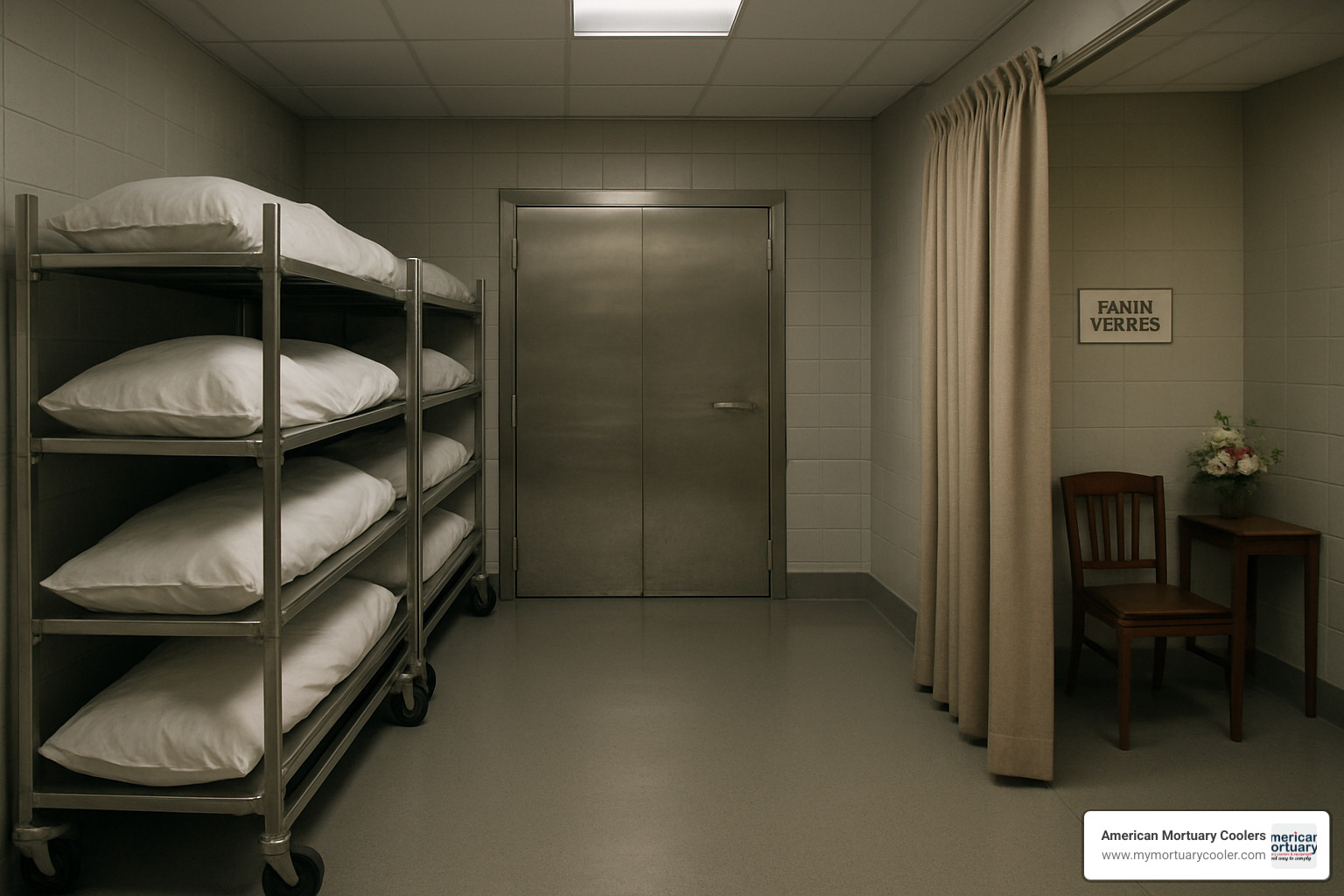
| Feature | Cold Rooms | Refrigerated Cabinets |
|---|---|---|
| Capacity | 10-100+ bodies | 1-20 bodies |
| Temperature Range | 2-5°C | 2-5°C |
| Loading Style | Walk-in access | Front/side loading |
| Customization | High | Moderate |
| Energy Efficiency | Variable | High |
| Installation Complexity | High | Low |
| Cost Range | $15,000-$100,000+ | $5,000-$25,000 |
Cultural considerations are becoming increasingly important as communities grow more diverse. Muslim ghusl preparation areas and Jewish tahara facilities require specific design accommodations. Some families need extended viewing periods or have delayed burial traditions that require specialized storage capabilities and access arrangements.
Forensic requirements add another layer of complexity. Chain-of-custody protocols demand secure, traceable storage with detailed logging systems. If you handle forensic cases, you'll need separate compartments and specialized documentation systems to maintain evidence integrity.
Special populations deserve special care too. Bariatric trays ensure you can accommodate individuals of all sizes with dignity. CuddleCot newborn care systems provide gentle cooling alternatives for the smallest patients, offering families a more comforting experience during an unimaginable time.
Meeting Health & Safety Regulations
Regulatory compliance isn't optional - it's the baseline for professional mortuary operations. OSHA requirements protect your staff, EPA standards govern refrigerant use, and state codes set specific mortuary operation standards. The good news is that modern systems make compliance straightforward when you know what to look for.
Temperature loggers are mandatory in most areas, and digital systems make this easier than ever. These systems automatically record temperature readings and can generate the reports and graphs you need for regulatory inspections. Many interface with printers for immediate documentation, taking the guesswork out of compliance record-keeping.
Alarm systems must include both audio and visual alerts for temperature deviations, power failures, and door ajar conditions. Modern systems go further with remote monitoring capabilities that can alert you via phone or email even when you're not at the facility. No more worrying about equipment failures during off-hours.
EPA-friendly refrigerants like R-134a are now standard across the industry. These CFC-free cooling systems meet environmental regulations while providing reliable performance. They include features like low ambient controls and defrost timers that maintain efficiency regardless of outside weather conditions.
Staff safety deserves special attention. Proper PPE protocols, ergonomic handling procedures, and emergency response training protect your team. Many facilities now use battery-operated and hydraulic scissor lifts to reduce manual handling injuries while ensuring safe transfer of remains.
Scientific research on refrigeration hygiene
Respecting Religious & Forensic Requirements
Every family brings their own traditions and needs to your facility. Mortuary-storage systems must be flexible enough to honor these diverse requirements while maintaining the technical standards that ensure proper preservation.
Viewing windows and private bays allow families to maintain connection with their loved ones during extended storage periods. Some facilities create specialized areas for religious preparations, balancing accessibility with proper refrigeration requirements. It's about making families feel comfortable during an already difficult time.
Carbon filtration systems control odors and contaminants, which becomes especially important when accommodating extended viewing periods or cultural requirements for delayed burial. These systems work alongside your primary refrigeration to maintain a respectful environment for everyone.
Forensic chain-of-custody requirements demand specialized protocols and storage configurations. You'll need detailed documentation systems, secure access controls, and often separate storage areas for different types of cases. Evidence preservation isn't just about following rules - it's about supporting justice for families seeking answers.
The technology keeps improving too. CuddleCot systems for newborn care provide gentle cooling without traditional refrigeration methods, offering families a more natural experience. These innovations show how the industry continues evolving to serve families with greater compassion and dignity.
Capacity Planning, Customization, Costs & Innovations
Planning your mortuary-storage capacity is like planning for a family gathering - you need to think about your regular needs plus those unexpected times when everyone shows up at once. Smart facilities use load calculations and body/day metrics to figure out their storage requirements, typically planning for 3-7 days of average capacity as their baseline.
Most funeral homes find that tiered racks and adjustable shelving are game-changers for maximizing space. These multi-tier configurations range from 2-5 levels, letting you stack storage vertically when floor space is tight. Think of it as building up instead of out - a 4-tier rack can give you four times the storage in the same footprint.
The price range for mortuary racks varies quite a bit. Basic 2-tier models start under $1,000, while premium stainless steel 5-tier units can run over $3,000. The investment pays off when you consider how much more capacity you're getting from the same square footage.
Energy efficiency has become a major consideration as utility costs keep climbing. Modern systems comply with Federal EISA Title III, Section 312 requirements and feature high-density insulated panels that keep your electric bills manageable. LED lighting and smart monitoring systems add efficiency while cutting down on maintenance headaches.
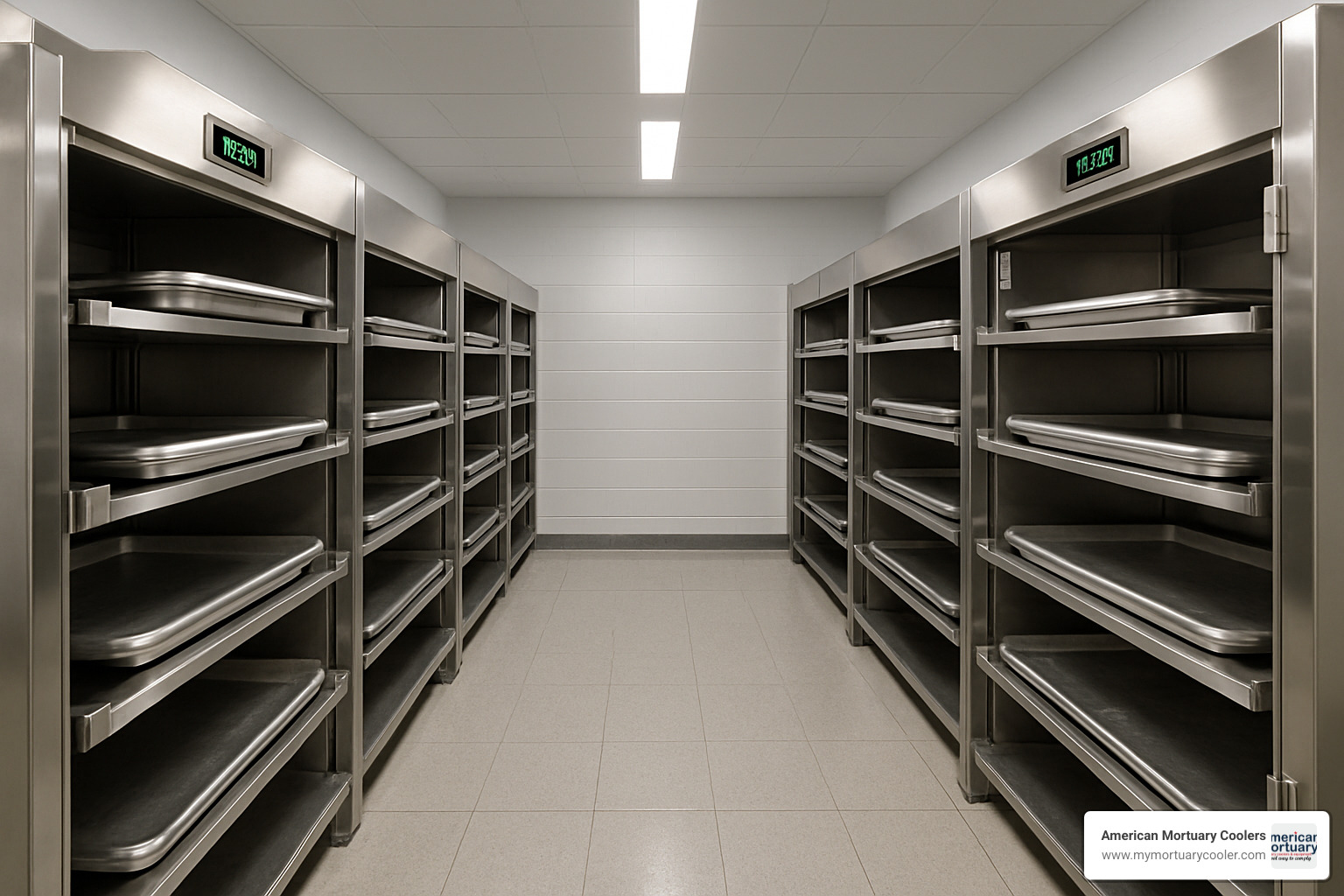
The technology side of mortuary-storage keeps getting more impressive. Liquid-cool blankets and direct-contact cooling systems can bring temperatures down fast - much faster than traditional air cooling. IoT monitoring lets you check temperatures from your phone, and some facilities are even testing drone temp checks for large installations (though that might be overkill for most of us).
When disasters strike, having mobile solutions ready makes all the difference. Disaster trailers and portable morgue units can be deployed quickly to handle surge capacity. These self-contained units don't depend on local power or infrastructure, which is crucial when communities are dealing with emergencies.
Sizing Your Facility
Getting the size right for your mortuary-storage facility means thinking about several key factors: your typical daily caseload, peak capacity needs, how long you store remains, and the space you have to work with. Most smaller facilities find that 2-body, 3-body, and 4-body units hit the sweet spot for their needs.
Multi-tier racks are perfect when you're short on floor space but have decent ceiling height. A 4-tier system can quadruple your storage capacity in the same footprint. Just remember to consider your staff's comfort and safety - nobody wants to be struggling with the top tier all day.
Smart facilities use redundancy formulas to stay prepared. A common approach is sizing your primary storage for 150% of average capacity, with backup systems that can handle 100% of the load. This gives you breathing room during busy periods and keeps you compliant with health department requirements.
Walk-in cold rooms start making financial sense when you're regularly handling more than 8-10 bodies. They're easier to access, simpler to clean, and give you more flexibility in how you arrange storage. The trade-off is more complex installation and higher upfront costs, but the operational benefits often justify the investment.
Budgeting & Acquisition Models
Understanding the real cost of mortuary-storage systems means looking beyond the sticker price. Purchase versus lease options each have their place depending on your cash flow and long-term plans.
Purchase costs vary widely based on what you need. Basic 2-body refrigerated cabinets start around $6,000-$8,000, while 4-body units typically run $9,000-$15,000. Walk-in cold rooms can range from $15,000 for simple setups to over $100,000 for large systems with all the bells and whistles.
Rental containers and temporary solutions offer flexibility for facilities with changing needs. Monthly rental rates typically run $500-$2,000 depending on capacity and features. This can be a smart choice if you only occasionally need extra capacity or want to test different configurations before committing to a permanent installation.
Maintenance contracts are worth their weight in gold for keeping systems running reliably. Annual service contracts typically cost 10-15% of the equipment purchase price and include regular inspections, preventive maintenance, and priority repair service. Given how critical mortuary-storage is to your operations, these contracts provide essential peace of mind.
When comparing options, cost-per-body metrics help you see the real picture. Don't just look at the purchase price - factor in installation costs, energy consumption, maintenance needs, and expected lifespan. A higher-quality system with better energy efficiency might cost more upfront but save money over time.
Emerging Tech & Mobile Solutions
The future of mortuary-storage technology is all about working smarter, not harder. Direct-contact liquid cooling represents a major step forward, providing rapid temperature reduction that traditional air-cooling systems simply can't match. This technology shines in emergency situations where quick cooling is essential.
Solar backup systems are becoming more popular, especially in areas where power outages are common. These systems keep critical cooling running even during extended blackouts, protecting stored remains regardless of what's happening with the local power grid.
Smart sensors and IoT monitoring give you unprecedented insight into how your systems are performing. Modern systems track temperature, humidity, door openings, energy use, and equipment health. Predictive maintenance alerts help you fix problems before they become failures, reducing downtime and repair costs.
Mobile solutions keep getting more sophisticated and capable. Today's mobile mortuary units can be deployed quickly and include features like independent power generation, satellite communication for remote monitoring, and modular expansion capabilities that adapt to changing needs.
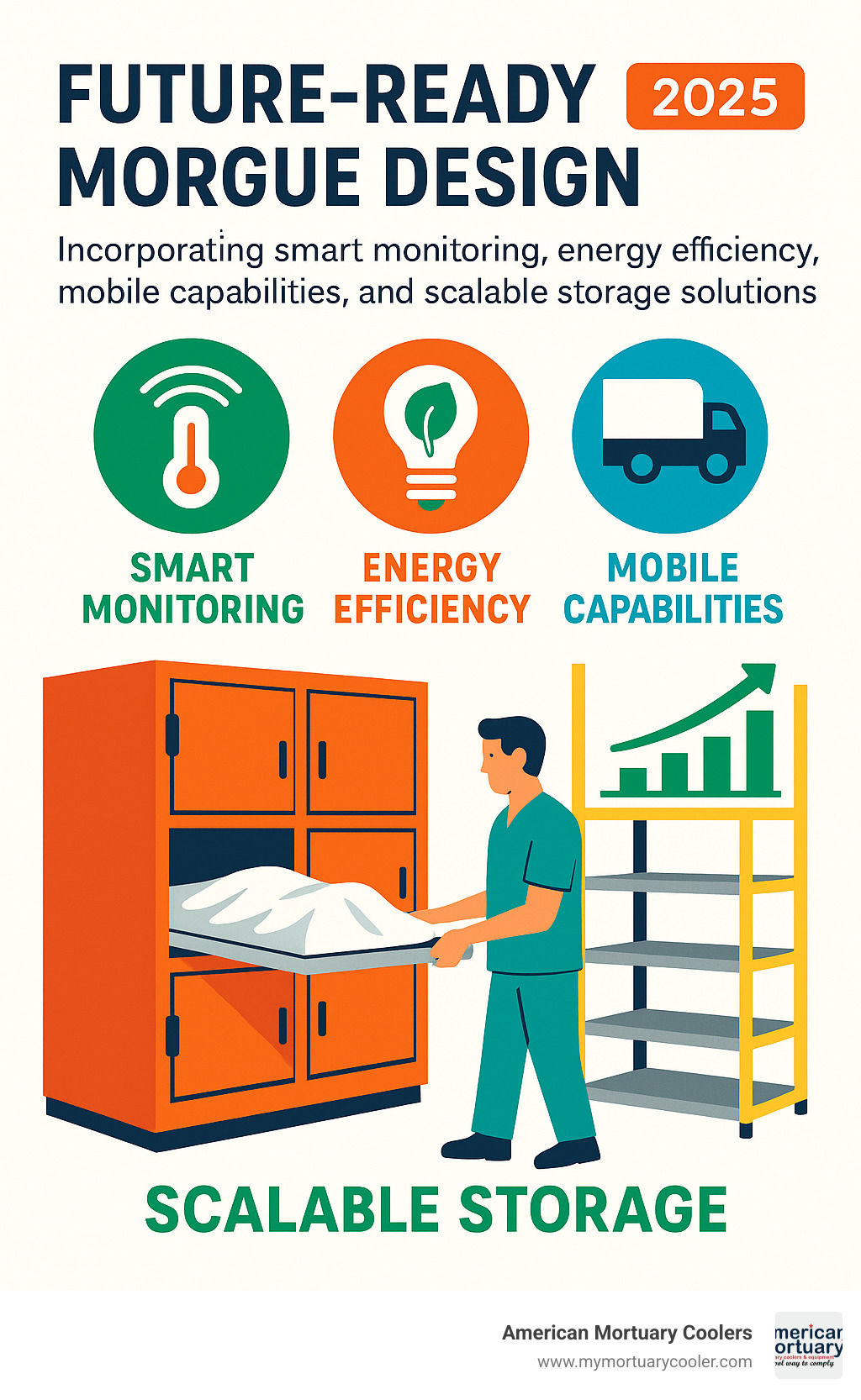
Frequently Asked Questions about Mortuary-Storage
When it comes to mortuary-storage, we hear the same questions from facility managers across the country. Whether you're planning your first installation or upgrading existing equipment, these answers will help you make informed decisions that serve your community with dignity and professionalism.
What temperature range is required?
The sweet spot for mortuary-storage is 2-5°C (35-41°F) - and there's real science behind this narrow range. This temperature zone dramatically slows decomposition by reducing bacterial growth and enzymatic processes, while staying safely above freezing to preserve tissue integrity for viewing and forensic work.
Think of it like this: too warm, and decomposition accelerates rapidly. Too cold, and you risk freezing damage that can affect tissue appearance and forensic evidence. That 2-5°C range gives you the preservation you need while maintaining the dignity families deserve.
Humidity control runs hand-in-hand with temperature management. Most professional systems maintain 85-95% relative humidity to prevent dehydration while avoiding the condensation that breeds bacteria. Modern units handle this automatically with built-in defrost cycles that prevent ice buildup on cooling coils.
Here's something many people don't realize: continuous temperature monitoring isn't just good practice - it's usually required by law. Digital systems with data logging provide the documentation you need for compliance inspections. Plus, they'll alert your staff immediately if something goes wrong, giving you peace of mind around the clock.
How do facilities choose between racks, cabinets and cold rooms?
This is where understanding your specific needs really pays off. The choice between different mortuary-storage solutions comes down to four key factors: caseload volume, available space, staffing levels, and workflow requirements.
If you're handling fewer than 5-6 bodies regularly, individual refrigerated cabinets often make the most sense. They're cost-effective, space-efficient, and easier to install. For facilities with consistent moderate volume (8-15 bodies), walk-in cold rooms typically provide better accessibility and flexibility for your staff.
High-volume facilities (20+ bodies) usually benefit from combination systems - think cold rooms for bulk storage plus individual cabinets for specialized needs or overflow capacity.
Space planning gets interesting when you consider multi-tier rack systems. These can literally multiply your storage capacity within the same footprint. However, walk-in cold rooms need more square footage but offer much better accessibility for daily operations.
Your staffing situation also influences the decision. Front-loading cabinet systems (there are 204 models available in the market) work well for single-person operation, while side-loading systems (22 models available) might better suit facilities with specific workflow requirements or space constraints.
What are the typical costs for installing a 4-body cooler?
Let's break down the real numbers for a complete 4-body mortuary cooler installation. You're looking at $12,000 to $20,000 total, which includes the unit itself, delivery, electrical work, and permits. The unit price alone typically runs $9,000-$15,000, depending on features like stainless steel construction, digital controls, and alarm systems.
Delivery costs can vary quite a bit based on your location and site accessibility. At American Mortuary Coolers, we provide direct delivery across the contiguous 48 states, which helps control shipping costs and ensures your sensitive refrigeration equipment gets proper handling. Remote locations might see additional delivery charges, but we work with you to minimize these costs.
The electrical requirements usually call for 220-230V service with appropriate amperage for the compressor and accessories. Professional electrical installation typically costs $500-$2,000, depending on complexity and local rates. Some facilities need electrical infrastructure upgrades, which we can help you plan for upfront.
Permitting costs generally range from $100-$500, though this varies by jurisdiction. You might need health department approvals, building permits, and electrical permits. Working with experienced suppliers like us helps steer these requirements efficiently and avoid costly delays or compliance issues.
The investment makes sense when you consider the peace of mind and professional capability a quality system provides. Your families deserve the assurance that their loved ones are being cared for with the highest standards, and the right equipment makes that possible.
Conclusion
Choosing the right mortuary-storage solution is one of the most important decisions you'll make for your facility. It's about more than just refrigeration - it's about providing dignified care when families need it most. The good news is that today's scalable solutions can grow with your needs, whether you're starting with a single-body cabinet or planning a comprehensive cold room system.
Your journey toward the perfect storage solution starts with understanding your unique situation. A small funeral home serving a rural community has different needs than a large medical examiner's office in a metropolitan area. But both deserve equipment that delivers regulatory peace-of-mind while honoring the trust families place in their care.
Modern mortuary-storage systems offer incredible flexibility. You might start with a compact 2-body refrigerated cabinet and add capacity as your business grows. Or perhaps you need the accessibility and customization options that only a walk-in cold room can provide. The beauty of working with the right supplier is having options that fit both your current budget and future vision.
At American Mortuary Coolers, we've built our reputation on understanding that every facility tells a different story. Our Tennessee-based manufacturing gives us the flexibility to create custom solutions, while our delivery network across the contiguous 48 states means you'll get personal service no matter where you're located. From that first phone call through installation and beyond, we're here to make sure your mortuary-storage system serves your community exactly as it should.
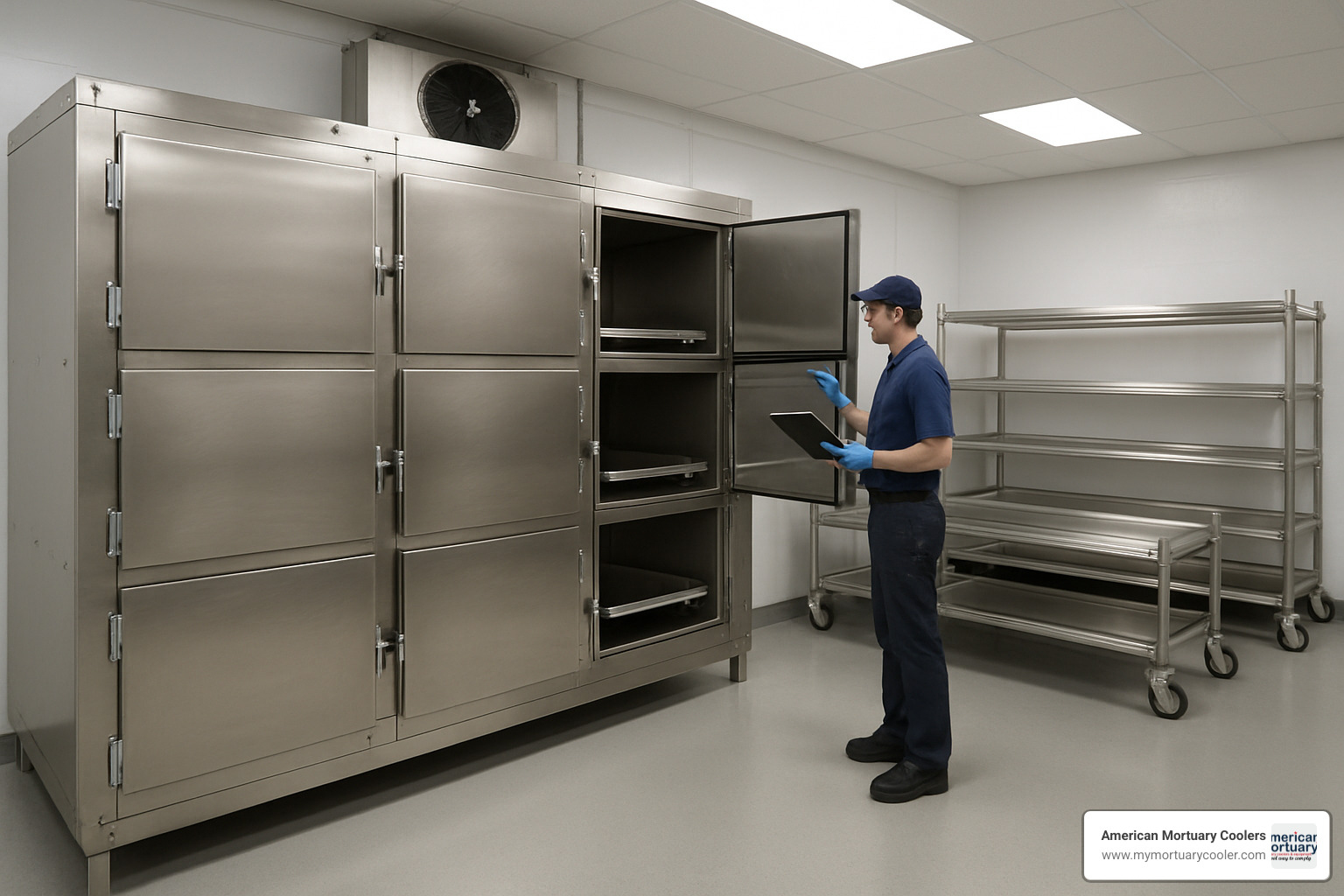
The funeral industry keeps evolving, and that's actually exciting. New technologies make systems more reliable and energy-efficient. Changing regulations ensure higher standards of care. Mobile solutions provide surge capacity when communities face unexpected challenges. By staying informed and working with experienced partners, you're not just buying equipment - you're investing in your ability to serve families with dignity and professionalism for decades to come.
The best mortuary-storage system is the one that lets you focus on what matters most: caring for families during their most difficult moments. When your equipment works flawlessly in the background, you can dedicate your energy to providing the compassionate service that makes all the difference.



